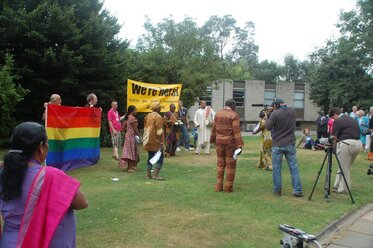We have remained confident in the heated lead-up to this week’s conference that its outcome will not change the commitment of the Episcopal Church to affirm and support the full human dignity of LGBTIQ+ people. We are also concerned about the pastoral impact of repeated archconservative attempts to proscribe queer sexuality, even as such efforts are thwarted and ultimately fall short–just yesterday conference planners pulled such language from a “Lambeth Call” on Human Dignity. We continue to decry the language’s inclusion in the first place in a process clouded by a lack of transparency and trust. This whole dynamic reminds us of how trans and non-binary people are being used in the United States and other countries around the world–not least in England–to drive political wedges in the body politic.
The Lambeth Conference has a fraught history when it comes to LGBTIQ+ people. Meeting once every ten years, it draws bishops from across the Anglican Communion. It is one of four “Instruments of Communion” in a tradition whose polity does not utilize a centralized form of authority in the manner of some other Christian denominations. Votes at this conference are not binding on the provinces of the Anglican Communion across the globe. Yet previous votes have reverberated over the years, and in particular, the controversial 1998 Lambeth Conference Resolution I.10 that defined marriage in strictly heterosexual terms, also resting on considerable assumptions about defining “man” and “woman,” as well.
The 2008 Lambeth Conference did not include resolution or “call” votes, but its planners excluded the Right Reverend V. Gene Robinson, at that time the only openly gay bishop in the Anglican Communion. Bishop Gene came to the conference anyway, supported by a coalition called the Inclusive Communion witness. Bishop Gene’s experience at Lambeth is included in the powerful film Love Free or Die.
TransEpiscopal members formed a small part of that Inclusive Communion witness in 2008. One panel discussion, “Listening to Transgender People,” was organized by the Reverend Dr. Tina Beardsley, an openly transgender priest of the Church of England and board member of the England-based LGBTIQ+ advocacy group Changing Attitude. The panel was an historic first for trans people in the Anglican Communion. Over the course of the conference we wrote a series of blog posts describing our experience of Lambeth as transgender Christians (July 2008, August 2008). We were struck then as now by the power of actually listening to the voices of LGBTIQ+ people, lay and ordained, from across the Communion, affirming our dignity, revealing the power of the Spirit lifting us up and connecting us in the body of Christ across all manner of differences.
This power of authenticity, connection, and true, transformative communion is what we pray will finally be fostered by this year’s Lambeth Conference, despite the last minute turns in process and content.
At this year’s conference several openly gay bishops were invited, but their spouses were not. Earlier this month, the Episcopal Church’s General Convention passed a resolution decrying this exclusion. And then last week one of the “Lambeth Calls” (or white papers) on Human Dignity inserted language at the last minute denying the theological validity of marriage equality, using language from 1998 Resolution I.10. Bishops also learned last week that they would be asked to vote on the various Lambeth Calls with an electronic device, after having been assured that bishops would not be voting on resolutions at this Lambeth Conference.
The inserted I.10 language in the Human Dignity Call paper was truly unfortunate, demeaning LGBTIQ+ people and undermining trust. Now, thanks to a cascade of public protest by supportive bishops and others, the conference planners have changed course. Two days ago an option to vote “no” was added to the previous voting options. Yesterday revisions to the Call language were released, removing the undermining I.10 language. We concur with the Rev. Canon Susan Russell’s reflection on these events that this pressure-influenced change is historic. It is important and at the very least high time to see recognition that the Anglican Communion is not in fact of one mind on the God-given goodness of LGBTIQ+ personhood and relationships and an acknowledgment that several Anglican provinces have already “blessed and welcomed same sex union/marriage after careful theological reflection and a process of reception.” Important too will be an affirmation that “prejudice on the basis of gender or sexuality threatens human dignity.”
Even as we recognize the significance of this shift in acknowledging the lived, affirmed reality of LGBTIQ+ people in various provinces of the wider Anglican Communion, we are clear that we continue to have much work to do. While the proscriptive language has been removed from the call paper on Human Dignity, we want to specifically name and reject a theology of gender complementarity as underlying Lambeth I.10’s restrictive definition of marriage as between a man and woman. It is not sufficient simply to decry this clause as homophobic and, indeed, implicitly transphobic. It is founded on a theology of the human person that is fundamentally binary in its understanding of gender, a theology with which we deeply disagree.
We decry the politics of division that created this turmoil and sought to preempt a time of discernment and learning across the communion by trying to force a vote against marriage for same-gender couples. We pray for a future time when the Anglican Communion as one voice can uphold the full dignity of LGBTIQ+ people, including our marriages.
We give thanks for the important, challenging work The Episcopal Church has engaged over the last 50 years to affirm the human dignity and sacramental equality of LGBTIQ+ people in the church and the world. We are grateful for the bishops, priests, deacons, and lay leaders who have tirelessly lifted up LGBTIQ+ people and have actively resisted insidious efforts to deny the God-given goodness of our genders and sexualities, inherent qualities of our humanity that refuse to be contained by binaries.


 RSS Feed
RSS Feed